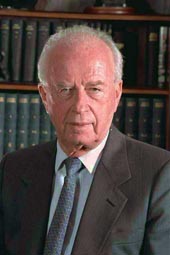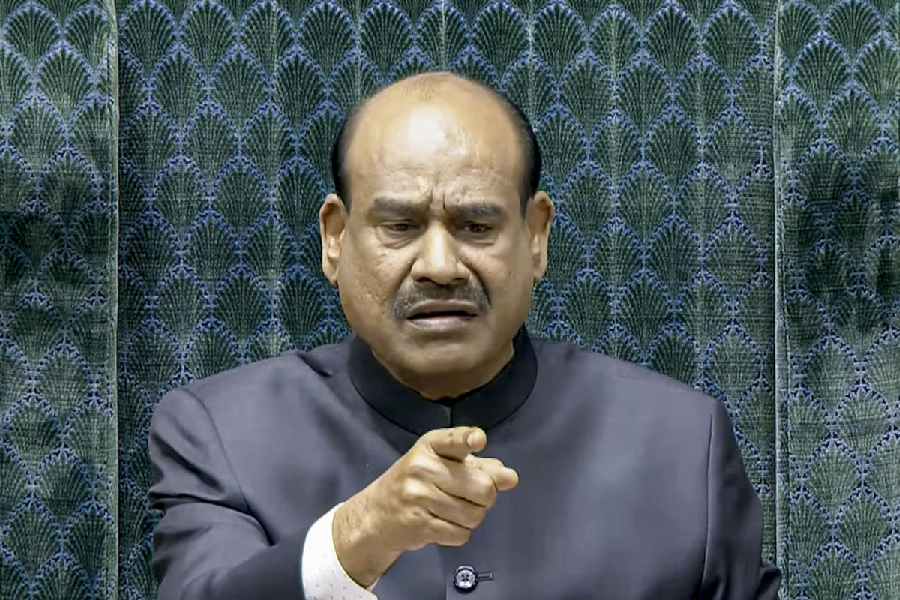 |
 |
| (Top) Rabin and Arafat: Incomplete task) |
Jerusalem, Nov 13 (Reuters): The guest lists tell it all.
Due at ceremonies this week to remember the assassination in 1995 of Israeli Prime Minister Yitzhak Rabin are a US secretary of state, a former US President and a gaggle of high-ranking European ministers.
A year after the death of Rabin’s Nobel Peace Prize partner Yasser Arafat, Palestinians held a modest ceremony at the graveside with only one accredited ambassador present.
History has been kind to Rabin, who was killed at the height of peacemaking efforts, shot dead by an ultranationalist Jew who opposed interim accords with the Palestinians.
Arafat declined in isolation, accused by much of the world of obstructing peace despite his denials that he was behind violence in an uprising that erupted after talks failed in 2000.
Dennis Ross, former US envoy to the West Asia, saw it as revealing that not only the US, but also European and Arab countries were absent from the ceremonies for Arafat.
“It looks as if the world sees Arafat as someone who ended his life as someone who was determined to prevent peace or was against it,” said Ross, who blamed Arafat for the failure of the Camp David talks hosted by former US President Bill Clinton.
In the early 1990s, Rabin and Arafat secretly negotiated a deal through teams in Oslo. Arafat’s aim was to win a state in the occupied West Bank, Gaza and Arab East Jerusalem; Rabin’s was to achieve security for Israel and normal ties with Arabs.
But both died without realising objectives that still look far from being met by their successors.
“The peace process ended with Rabin’s murder,” Arafat said after the assassination.
After the failure of negotiations and the start of the Intifada, Israelis elected Prime Minister Ariel Sharon, an opponent of the Oslo accords ready to use tough military measures against the Palestinian uprising.
Accusing Arafat of encouraging suicide bombings and other attacks, Sharon sent tanks and troops to the headquarters of the man Palestinians saw as the symbol of their struggle for nationhood. Israel and Washington shunned him.
Three months after Arafat died from a mystery ailment, his successor President Mahmoud Abbas agreed a truce that helped smooth the way for the Israeli withdrawal from the Gaza Strip after 38 years of occupation.
But hopes that the truce and Gaza pullout might revive negotiations on a US-backed peace “road map” for a Palestinian state alongside a secure Israel remain unfulfilled.
Neither side has met road map obligations ? the Palestinians to start disarming militant factions and the Israelis to freeze West Bank settlement building.
“I really feel there’s a need much more for a third party to build bridges between the two sides before it’s too late,” said Ross.
Both sides also have internal concerns. Israel is moving towards early elections due to a crisis in the ruling coalition. Palestinians are preparing for a parliamentary ballot that Hamas Islamic militants will contest for the first time.
Even if Israel and the Palestinians return to negotiations at some stage, positions on the main sticking points behind the failure of talks in 2000 have not changed.
Sharon says Israel will keep major West Bank settlements forever, with U.S. approval, as well as retaining all of East Jerusalem as part of an“indivisible capital”. Palestinians say East Jerusalem must be the capital of any viable state for them.
Abbas also sticks to the demand for a“right of return” to homes in what is now Israel for refugees from the 1948 war at the founding of the Jewish state. Israel will not accept that.
”I don't suspect you're going to see much taking place next year because next year is what I would call a year of internal conversation,” said Aaron Miller, a former Middle East adviser to six U.S. secretaries of state.
”It's a time where both sides would have to look inward to try to get some sense of what their publics want.”










